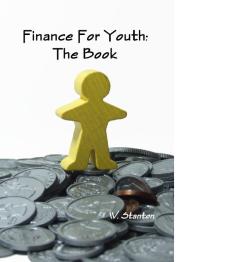Note from Wil:
This is a post from Maria Rainer, a self-described “blog junkie”. Maria seems to be writing right in my wheel-house with articles on online education, online degrees, and this latest effort of hers which is a great idea.
I like to include the writings and opinions of as many people as I can, regardless of whether or not I agree with someone’s opinion. If you want to contribute to Finance For Youth: The Blog, send me an email:
wil@finance4youth.com.
Money management—as one of the most recent posts has demonstrated, it’s a principle that is rather difficult for some children to grasp. And like already mentioned in the previous article, if money management skills are not taught at an early age, your child can suffer many consequences and hardships in their future—they can get into debt after college, be forced to barely survive pay check-to-pay check, or ruin their credit early on, preventing them from acquiring a house or car. While open communication and positive affirmation for saving are great techniques to teach your child about finances, another way is discreetly disguise money management lessons via games. The games listed below (which vary from board games, online games and iPhone apps) are designed to teach your children all about their finances, including money management, debt and even the consequences of bad credit—all in a fun and engaging way.
1. Pay Day.
 This game may have been originally created in 1975, but the lessons that your child can secretly learn while having a blast with family and friends is still impactful today. Of course the game has had a huge facelift and is modern-looking, but it still teaches the traditional lessons as the original: children learn about employment, loans and interest, as well as the importance of paying bills and handling unexpected expenses. Price: $14.98 on Amazon.
This game may have been originally created in 1975, but the lessons that your child can secretly learn while having a blast with family and friends is still impactful today. Of course the game has had a huge facelift and is modern-looking, but it still teaches the traditional lessons as the original: children learn about employment, loans and interest, as well as the importance of paying bills and handling unexpected expenses. Price: $14.98 on Amazon.
2. The Debt-Free Game.
I f the title didn’t blatantly explain the premise of the game as it is, the Debt-Free Game is a board game designed to teach both children and adults about all different aspects of finance, including creating emergency funds, saving for college, paying off credit card debt and car notes. It even teaches children how to differentiate the difference between “wants” and “needs.” The first person to complete their “money tree” using a set of dimes is dubbed the winner. This game is exclusively sold online. Price: $22
f the title didn’t blatantly explain the premise of the game as it is, the Debt-Free Game is a board game designed to teach both children and adults about all different aspects of finance, including creating emergency funds, saving for college, paying off credit card debt and car notes. It even teaches children how to differentiate the difference between “wants” and “needs.” The first person to complete their “money tree” using a set of dimes is dubbed the winner. This game is exclusively sold online. Price: $22
3. The Bad Credit Hotel.
The Bad Credit Hotel, which is a by-product of the U.S. Treasury Department, is designed to teach children about, well “bad credit.” Based in a haunted-like hotel, players must use smart-credit card practices and techniques to build up their credit and move on to the next stage. It has “clues” that tell players what they need to do while simultaneously educating players on the importance of credit. Once the player earns a total score of 850 (which is a real-life perfect credit score) he or she wins the game. Price: Free
4. Save! The Game.
 Lastly the interactive iPhone app Save! The Game is also a great game to teach your child about finance-smarts. As the name suggests, this game takes children into a fantasy world in order to teach children about the importance of saving money and avoiding impulse shopping: players who can dodge the evil “iwannas” successfully and make it to the bank wins the game. Price: Free
Lastly the interactive iPhone app Save! The Game is also a great game to teach your child about finance-smarts. As the name suggests, this game takes children into a fantasy world in order to teach children about the importance of saving money and avoiding impulse shopping: players who can dodge the evil “iwannas” successfully and make it to the bank wins the game. Price: Free
Author Bio:
Maria Rainier is a freelance writer and blog junkie. She is currently a resident blogger at First in Education where she writes about education, online colleges, online degrees etc. In her spare time, she enjoys square-foot gardening, swimming, and avoiding her laptop.

















 Earlier this week, Americans celebrated
Earlier this week, Americans celebrated 




















 Since this is the month where we all have to pay money we don’t have in taxes that won’t be spent well, I decided to break loose with the secrets to real wealth that all
Since this is the month where we all have to pay money we don’t have in taxes that won’t be spent well, I decided to break loose with the secrets to real wealth that all